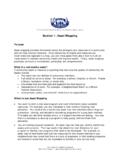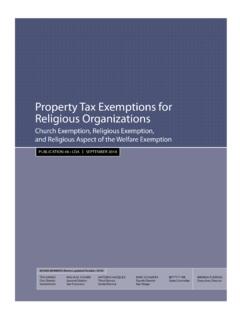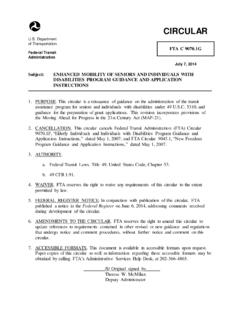Transcription of Political Campaign and Lobbying Activities of IRC 501(c)(4 ...
1 2003 EO CPE Text Exempt Organizations-Technical Instruction Program for FY 2003. Political Campaign and Lobbying Activities of IRC 501(c)(4 ), (c)(5), and (c)(6) Organizations By John Francis Reilly and Barbara A. Braig Allen Exempt Organizations-Technical Instruction Program for FY 2003. Political Campaign and Lobbying Activities of IRC 501(c)(4 ), (c)(5), and (c)(6) Organizations By John Francis Reilly and Barbara A. Braig Allen Overview Purpose This article is intended to provide EO with information about the rules relating to the Political Campaign and Lobbying Activities of IRC 501(c)(4 ), (c)(5), and (c)(6) organizations. An Appendix contains the Proxy Tax Check Sheet applicable for certain IRC. 501(c)(4 ), (c)(5), and (c)(6) organizations used in Projects 206 and 207. In This Article This article contains the following topics: Topic See Page Overview 1. A. General Rules Relating to Lobbying and Political 2.
2 Campaign Activities by IRC 501(c)(4 ), (c)(5), and (c)(6). Organizations B. Tax on Political Expenditures - IRC 527(f) 6. C. Separate Segregated Fund under IRC 527(f) 13. D. Disallowance and Notification - IRC 162(e) and 6033(e) 19. 1. In General 19. 2. History of Regulations and Administrative 21. Pronouncements 3. Reporting and Notice Requirements and Proxy Tax 22. a. Organizations Excepted 22. b. Exempt organization Requirements 27. 4. Definitional Issues Regarding Lobbying 32. 5. Lobbying Purpose 40. 6. Cost Allocations 45. E. Disclosure Requirements 53. Appendix 59. Detailed Subject Directory 62. Political Campaign and Lobbying Activities of IRC 501(c)(4 ), (c)(5), and (c)(6) Organizations page L-1. Exempt Organizations-Technical Instruction Program for FY 2003. A. General Rules Relating to Lobbying and Political Campaign Activities by IRC 501(c)(4 ), (c)(5), and (c)(6).
3 Organizations May IRC Yes. Organizations described in IRC 501(c)(4 ), (c)(5), and (c)(6) may engage 501(c)(4 ), (c)(5), in an unlimited amount of Lobbying , provided that the Lobbying is related to or (c)(6) the organization 's exempt purpose. Organizations Engage in This principle is enunciated in Rev. Rul. 61-177, 1961-1 117, which Attempts to Influence holds that a corporation organized and operated primarily for the purpose Legislation of promoting a common business interest is exempt under IRC 501(c)(6). ( Lobbying )? even though its sole activity is introducing legislation germane to such common business interest. Rev. Rul 61-177 notes that there is no requirement, by statute or regulations, that a business league or chamber of commerce must refrain from Lobbying Activities to qualify for exemption. The rule set forth in Rev. Rul. 61-177 applies to organizations described in IRC 501(c)(4 ) and (c)(5) as well.
4 See Rev. Rul. 67-293, 1967-1 185, and Rev. Rul. 71-530, 1971-2 237. May IRC 501(c)(4 ), (c)(5), and (c)(6) organizations may engage in Political IRC 501(c)(4 ), campaigns on behalf of or in opposition to candidates for public office provided (c)(5), or (c)(6) that such intervention does not constitute the organization 's primary activity. Organizations Engage in The regulations under IRC 501(c)(4 ) provide that promotion of social Political Campaign welfare does not include participation or intervention in Political campaigns. Activities ? Reg. (c)(4)-1(a)(2)(ii). 34233 (Dec. 3, 1969) reaches the same conclusion with respect to labor unions described in IRC 501(c)(5) and business leagues described in IRC 501(c)(6). The contrasts support of a candidate for office with Lobbying Activities . Continued on next page Political Campaign and Lobbying Activities of IRC 501(c)(4 ), (c)(5), and (c)(6) Organizations page L-2.
5 Exempt Organizations-Technical Instruction Program for FY 2003. A. General Rules Relating to Lobbying and Political Campaign Activities by IRC 501(c)(4 ), (c)(5), and (c)(6) Organizations, Continued May The notes that the content of specific legislative proposals may be IRC 501(c)(4 ), readily identified and related to the business or labor interests of the (c)(5), or (c)(6) organizations. Therefore, business leagues and labor unions may engage in Organizations Lobbying Activities that are germane to their exempt purposes as their Engage in primary activity. Political Campaign Activities ?, However, "support of a candidate for public office necessarily involves the continued organization in the total Political attitudes and positions of the candidate.". Because of this, the concluded that "this involvement transcends the narrower [exempt] interest" of the organization and could not be the primary activity of an organization described in either IRC 501(c)(5) or IRC 501(c)(6).
6 May IRC 501(c) IRC 501(c) organizations may generally make expenditures for Political Organizations Campaign Activities if such Activities (and other Activities not furthering its Make exempt purposes) do not constitute the organization 's primary activity. Expenditures for IRC 527 Examples: "Exempt Function". Activities ? Social welfare organizations described in IRC 501(c)(4 ): (Rev. Rul. 81-95, 1981-1 332 -- because organization 's primary Activities promote social welfare, its less than primary participation in Political campaigns will not adversely affect its exempt status). Labor organizations described in IRC 501(c)(5): (Marker v. Schultz, 485. 1003 ( Cir. 1973) and 36286 (May 22, 1975)). Business leagues described in IRC 501(c)(6): ( 34233 (Dec. 3, 1969)). Continued on next page Political Campaign and Lobbying Activities of IRC 501(c)(4 ), (c)(5), and (c)(6) Organizations page L-3.
7 Exempt Organizations-Technical Instruction Program for FY 2003. A. General Rules Relating to Lobbying and Political Campaign Activities by IRC 501(c)(4 ), (c)(5), and (c)(6) Organizations, Continued Effect of Political Dues or contributions to IRC 501(c)(4 ), (c)(5), and (c)(6) organizations may be Campaign deductible as business expenses under IRC 162. Activity or Lobbying by an Political Campaign activity: IRC 501(c). organization on the Deductibility Amounts paid for intervention or participation in any Political Campaign of Dues or may not be deducted as a business expense. IRC 162(e)(2)(A). Contributions to the organization Lobbying : Under IRC 162. Amounts paid for direct legislative Lobbying expenses at the federal and state (but not the local) level may not be deducted as a business expense. Grass roots Lobbying expenditures also are not deductible. Amounts paid for contact with certain federal officials would not be deductible under IRC 162(e).
8 Amounts paid to an IRC 501(c) organization that are specifically for Political Campaign Activities or Lobbying , would not be deductible under IRC 162. If a substantial part of the Activities of the IRC 501(c) organization consists of Political Campaign Activities or Lobbying , a deduction under IRC 162 is allowed only for the portion of dues or other payments to the organization that the taxpayer can clearly establish was not for Political Campaign or Lobbying Activities . Reg. (c)(3). Until 1993, no mechanism existed at the association level to ensure notification to members of the disallowance. Continued on next page Political Campaign and Lobbying Activities of IRC 501(c)(4 ), (c)(5), and (c)(6) Organizations page L-4. Exempt Organizations-Technical Instruction Program for FY 2003. A. General Rules Relating to Lobbying and Political Campaign Activities by IRC 501(c)(4 ), (c)(5), and (c)(6) Organizations, Continued OBRA 1993 In 1993, Congress enacted the Omnibus Budget Reconciliation Act of 1993.
9 (OBRA 1993). The Act disallowed the deduction for direct Lobbying at the federal and state level as a business expense under IRC 162. Grassroots Lobbying and Political Campaign activity continued to be nondeductible. 13222 of OBRA 1993 amended IRC 6033, adding a new subsection to provide a system based on the disallowance of dues that builds in an incentive (or penalty) to ensure that associations notify their members. The trigger is contained in IRC 6033(e), which imposes reporting and notice requirements on tax-exempt organizations incurring expenditures to which IRC 162(e) applies. IRC 162(e)(3) denies a deduction for the dues or other similar amounts paid to certain tax-exempt organizations to the extent that: The organization , at the time the dues are assessed or paid, notifies the dues payer that the dues are allocable to nondeductible Lobbying and Political expenditures of the type described in IRC 162(e)(1).
10 Payments that are similar to dues include voluntary payments or special assessments used to conduct Political Campaign Activities . The reporting and notice requirements and proxy tax under IRC 6033(e) are discussed under D. Disallowance and Notification - IRC 162(e) and 6033(e) . Political Campaign and Lobbying Activities of IRC 501(c)(4 ), (c)(5), and (c)(6) Organizations page L-5. Exempt Organizations-Technical Instruction Program for FY 2003. B. Tax on Political Expenditures - IRC 527(f). What if an IRC 527(e)(2) defines "exempt function" as "the function of influencing or IRC 501(c) attempting to influence the selection, nomination, election, or appointment of organization any individual to any federal, state or local public office or office in a Political Makes organization , or the election of Presidential or Vice-Presidential electors, Expenditures whether or not such individual or electors are selected, nominated, elected or for "Exempt appointed.















